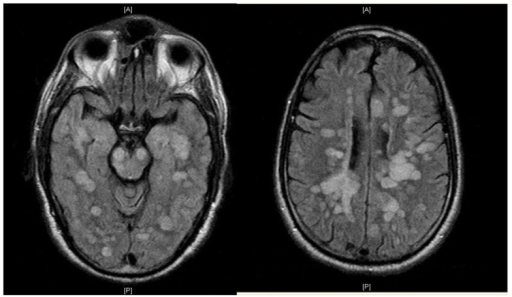Acute disseminated encephalomyelitis

Editor-In-Chief: Prab R Tumpati, MD
Obesity, Sleep & Internal medicine
Founder, WikiMD Wellnesspedia &
W8MD's medical weight loss NYC, sleep center NYC
Philadelphia medical weight loss and Philadelphia sleep clinics
| Acute disseminated encephalomyelitis | |
|---|---|

| |
| Synonyms | Post-infectious encephalomyelitis, post-vaccinal encephalomyelitis |
| Pronounce | N/A |
| Specialty | N/A |
| Symptoms | Fever, headache, nausea, vomiting, seizures, confusion, ataxia, vision problems |
| Complications | Seizures, coma, death |
| Onset | Rapid, often following an infection or vaccination |
| Duration | Days to weeks |
| Types | N/A |
| Causes | Often follows a viral infection or vaccination |
| Risks | Recent infection, vaccination, autoimmune disorders |
| Diagnosis | MRI, lumbar puncture, blood tests |
| Differential diagnosis | Multiple sclerosis, neuromyelitis optica, viral encephalitis |
| Prevention | N/A |
| Treatment | Corticosteroids, plasmapheresis, intravenous immunoglobulin |
| Medication | N/A |
| Prognosis | Generally good with treatment, but can vary |
| Frequency | Rare |
| Deaths | N/A |

Acute disseminated encephalomyelitis (ADEM) is an autoimmune disease marked by a sudden, widespread attack of inflammation in the brain and spinal cord. It is characterized by a brief but intense episode of inflammation in the central nervous system (CNS), often following a viral infection or vaccination.
Pathophysiology[edit]
ADEM is believed to be an autoimmune response where the body's immune system mistakenly attacks its own myelin, the protective covering of nerve fibers in the central nervous system. This results in demyelination, which disrupts the normal transmission of nerve impulses. The exact mechanism is not fully understood, but it is thought to involve molecular mimicry, where the immune system confuses myelin with viral antigens.
Clinical Presentation[edit]
Patients with ADEM typically present with a rapid onset of neurological symptoms such as headache, fever, nausea, and vomiting. Neurological deficits may include ataxia, hemiparesis, optic neuritis, and altered mental status. In severe cases, seizures and coma may occur.
Diagnosis[edit]
The diagnosis of ADEM is primarily clinical, supported by magnetic resonance imaging (MRI) findings. MRI typically shows multiple lesions in the white matter of the brain and spinal cord. These lesions are often bilateral and asymmetrical. Cerebrospinal fluid (CSF) analysis may show elevated protein levels and pleocytosis.
Treatment[edit]
The mainstay of treatment for ADEM is high-dose corticosteroids, such as methylprednisolone, to reduce inflammation and immune system activity. In cases where patients do not respond to steroids, intravenous immunoglobulin (IVIG) or plasmapheresis may be considered. Supportive care is also crucial to manage symptoms and prevent complications.
Prognosis[edit]
The prognosis for ADEM is generally favorable, with most patients experiencing significant recovery within weeks to months. However, some individuals may have residual neurological deficits. Recurrence is rare, distinguishing ADEM from multiple sclerosis, which is a chronic condition with recurrent episodes.
See also[edit]
Ad. Transform your life with W8MD's Budget GLP-1 injections from $75


W8MD offers a medical weight loss program to lose weight in Philadelphia. Our physician-supervised medical weight loss provides:
- Weight loss injections in NYC (generic and brand names):
- Zepbound / Mounjaro, Wegovy / Ozempic, Saxenda
- Most insurances accepted or discounted self-pay rates. We will obtain insurance prior authorizations if needed.
- Generic GLP1 weight loss injections from $75 for the starting dose.
- Also offer prescription weight loss medications including Phentermine, Qsymia, Diethylpropion, Contrave etc.
NYC weight loss doctor appointmentsNYC weight loss doctor appointments
Start your NYC weight loss journey today at our NYC medical weight loss and Philadelphia medical weight loss clinics.
- Call 718-946-5500 to lose weight in NYC or for medical weight loss in Philadelphia 215-676-2334.
- Tags:NYC medical weight loss, Philadelphia lose weight Zepbound NYC, Budget GLP1 weight loss injections, Wegovy Philadelphia, Wegovy NYC, Philadelphia medical weight loss, Brookly weight loss and Wegovy NYC
|
WikiMD's Wellness Encyclopedia |
| Let Food Be Thy Medicine Medicine Thy Food - Hippocrates |
Medical Disclaimer: WikiMD is not a substitute for professional medical advice. The information on WikiMD is provided as an information resource only, may be incorrect, outdated or misleading, and is not to be used or relied on for any diagnostic or treatment purposes. Please consult your health care provider before making any healthcare decisions or for guidance about a specific medical condition. WikiMD expressly disclaims responsibility, and shall have no liability, for any damages, loss, injury, or liability whatsoever suffered as a result of your reliance on the information contained in this site. By visiting this site you agree to the foregoing terms and conditions, which may from time to time be changed or supplemented by WikiMD. If you do not agree to the foregoing terms and conditions, you should not enter or use this site. See full disclaimer.
Credits:Most images are courtesy of Wikimedia commons, and templates, categories Wikipedia, licensed under CC BY SA or similar.
Translate this page: - East Asian
中文,
日本,
한국어,
South Asian
हिन्दी,
தமிழ்,
తెలుగు,
Urdu,
ಕನ್ನಡ,
Southeast Asian
Indonesian,
Vietnamese,
Thai,
မြန်မာဘာသာ,
বাংলা
European
español,
Deutsch,
français,
Greek,
português do Brasil,
polski,
română,
русский,
Nederlands,
norsk,
svenska,
suomi,
Italian
Middle Eastern & African
عربى,
Turkish,
Persian,
Hebrew,
Afrikaans,
isiZulu,
Kiswahili,
Other
Bulgarian,
Hungarian,
Czech,
Swedish,
മലയാളം,
मराठी,
ਪੰਜਾਬੀ,
ગુજરાતી,
Portuguese,
Ukrainian